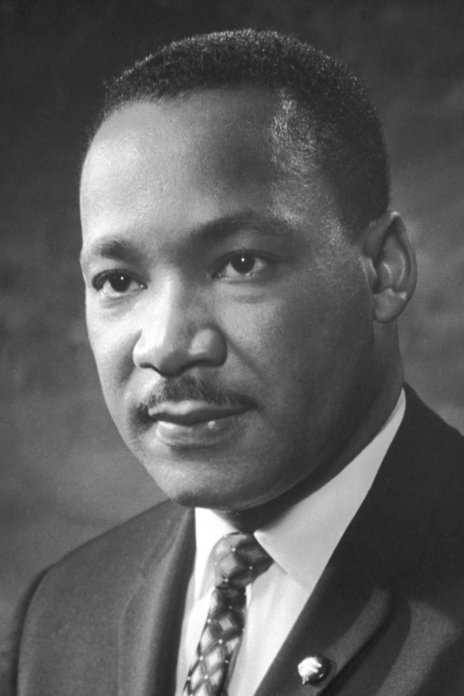Martin Luther King frasi celebri

Martin Luther King Frasi e Citazioni
da La forza di amare
La forza di amare
da La forza di amare
La forza di amare
Il sogno della non violenza
Citazioni di Martin Luther King
p. 234 sg.
Citazioni di Martin Luther King
Origine: Dal discorso al Lincoln Memorial di Washington, 28 agosto 1963; citato in Ferdie Addis, I have a dream. I discorsi che hanno cambiato la storia, traduzione di Valeria Bastia, De Agostini, Novara, 2012, p. 104 http://books.google.it/books?id=obMxU4M4kQ4C&pg=PT104. ISBN 978-88-418-7870-5
“La chiesa […] non è la padrona o la serva dello stato, ma la coscienza dello stato.”
da La forza d'amare
La forza di amare
“La salvezza dell'uomo è nelle mani dei disadattati creativi.”
da La forza d'amare
La forza di amare
“Ignorare il male equivale ad esserne complici.”
da Il sogno della non violenza. Pensieri
Il sogno della non violenza
Citazioni di Martin Luther King
Citazioni di Martin Luther King
Citazioni di Martin Luther King
Origine: Citato in Teresio Bosco, Uomini come noi, Società Editrice Internazionale, Torino, 1968.
“Questo 4 di luglio è vostro, non mio.”
da Il sogno della non violenza. Pensieri
Il sogno della non violenza
Origine: Lettera a un amico antisionista è una lettera aperta erroneamente attribuita a Martin Luther King. Cfr. Letter to an Anti-Zionist Friend.
Origine: Citazioni erroneamente attribuite, p. 234
Origine: Citazioni erroneamente attribuite, p. 234
Citazioni di Martin Luther King
Origine: Da The Words of Martin Luther King Jr., New Market Press, New York, 1983, p. 71; citato in Dennis Dalton, Gandhi, il Mahatma: il potere della nonviolenza, traduzione di Andrea Boni, ECIG, Genova, 1998, p. 13. ISBN 88-7545-842-1
Citazioni di Martin Luther King
Citazioni di Martin Luther King
Citazioni di Martin Luther King
Origine: Citato in AA.VV. 2018, p. 320.
“Cristo ci ha dato gli obiettivi, Mahatma Gandhi la tattica.”
Citazioni di Martin Luther King
Origine: Citato in AA.VV. 2018, p. 225.
Martin Luther King: Frasi in inglese
1960s, Address to Cornell College (1962)
1960s, Address to Cornell College (1962)
1960s, Address to Cornell College (1962)
1960s, Address to Cornell College (1962)
1960s, Address to Cornell College (1962)
1960s, Address to Cornell College (1962)
1960s, Address to Cornell College (1962)
1960s, Address to Cornell College (1962)
1960s, Address to Cornell College (1962)
1960s, Address to Cornell College (1962)
1960s, Address to Cornell College (1962)
1960s, Address to Cornell College (1962)
It is a law to rob us of our civil rights and job rights. It is supported by Southern segregationists who are trying to keep us from achieving our civil rights and our right of equal job opportunity. Its purpose is to destroy labor unions and the freedom of collective bargaining by which unions have improved wages and working conditions of everyone…Wherever these laws have been passed, wages are lower, job opportunities are fewer and there are no civil rights. We do not intend to let them do this to us. We demand this fraud be stopped. Our weapon is our vote.
Speaking on right-to-work laws in 1961, as quoted in Now Is the Time. Dr. Martin Luther King Jr. on Labor in the South: The Case for a Coalition (January 1986)
1960s
1950s, Rediscovering Lost Values (1954)
“The evils of capitalism are as real as the evils of militarism and evils of racism.”
1960s
Origine: As quoted in The Myth of American Diplomacy: National Identity and U.S. Foreign Policy https://books.google.it/books?id=DNId6HxkzQwC&pg=PA247&dq=%22The+evils+of+capitalism+are+as+real+as+the+evils+of+militarism+and+evils+of+racism%22 (1968)
1960s, Remaining Awake Through a Great Revolution (1965)
1950s, Rediscovering Lost Values (1954)
1960s, Remaining Awake Through a Great Revolution (1965)
Certainly we all want to live the well adjusted life in order to avoid neurotic and schizophrenic personalities. But I must honestly say to you tonight my friends that there are some things in our world, there are some things in our nation to which I'm proud to be maladjusted, to which I call upon all men of goodwill to be maladjusted until the good society is realized. I must honestly say to you that I never intend to adjust myself to segregation and discrimination. I never intend to become adjusted to religious bigotry. I never intend to adjust myself to economic conditions that will take necessities from the many to give luxuries to the few. I never intend to adjust myself to the madness of militarism and the self defeating effects of physical violence.
1960s, Keep Moving From This Mountain (1965)
It is necessary to love peace and sacrifice for it. We must concentrate not merely on the negative expulsion of war, but on the positive affirmation of peace. There is a fascinating little story that is preserved for us in Greek literature about Ulysses and the Sirens. The Sirens had the ability to sing so sweetly that sailors could not resist steering toward their island. Many ships were lured upon the rocks, and men forgot home, duty, and honor as they flung themselves into the sea to be embraced by arms that drew them down to death. Ulysses, determined not to be lured by the Sirens, first decided to tie himself tightly to the mast of his boat, and his crew stuffed their ears with wax. But finally he and his crew learned a better way to save themselves: they took on board the beautiful singer Orpheus whose melodies were sweeter than the music of the Sirens. When Orpheus sang, who bothered to listen to the Sirens? So we must fix our vision not merely on the negative expulsion of war, but upon the positive affirmation of peace. We must see that peace represents a sweeter music, a cosmic melody that is far superior to the discords of war.
1960s, The Quest for Peace and Justice (1964)
1960s, The Rising Tide of Racial Consciousnes (1960)
1950s, Three Ways of Meeting Oppression (1958)
“Let us be practical and ask the question: How do we love our enemies?”
1950s, Loving Your Enemies (Christmas 1957)
1950s, Loving Your Enemies (November 1957)
